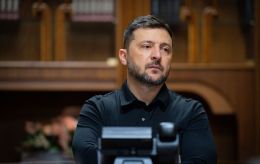EU foreign ministers to hold informal talks on frozen Russian assets
 Ukraine wants to receive frozen Russian assets from EU (Getty Images)
Ukraine wants to receive frozen Russian assets from EU (Getty Images)
Member states of the European Union are planning to discuss the fate of Russia's frozen assets at the end of August. However, the talks will be informal in nature — EU foreign ministers will gather in a special format, spokesperson for the European Commission Anouar El Anouni said during a briefing in Brussels on July 22, according to Ukrinform.
According to the spokesperson, EU foreign ministers indeed plan to discuss the fate of Russia's assets during an informal meeting held in the Gymnich format — meaning the talks will be entirely unofficial.
However, the EU maintains its position that Russia must pay for its war and destruction in Ukraine, as previously stated by High Representative for Foreign Affairs and Security Policy Kaja Kallas. The bloc has not backed away from that stance.
"We are already advancing that process. Russian assets have been frozen and/or confiscated in individual member states by local authorities, and the EU has introduced a mechanism to collect proceeds from those frozen assets," he noted.
El Anouni added that €3.6 billion in revenue from Russian assets has already been seized and transferred to support Ukraine.
"The latest tranche in May amounted to €2.1 billion, of which €1.9 billion was allocated for military aid, including €1 billion directed specifically to Ukraine's defense industry," the Commission spokesperson said.
Challenges with confiscating Russian assets
E-Ukraine has long called for the confiscation of Russian assets as compensation for the damages caused by Russia's invasion. Kyiv considers the frozen assets of the Russian Central Bank to be rightfully its own.
However, within the EU — which froze the bulk of these funds — there is significant opposition to such a move. As reported by Deutsche Welle back in March, the European Union has refrained from fully confiscating Russian assets due to objections from several member states.
Belgium, France, Germany, and Italy are known to be the most vocal opponents. Each of these countries has its own interests, often citing the lack of legal mechanisms as a reason for hesitation. Notably, the Belgian clearing house Euroclear holds the largest portion of Russia's frozen assets.
On the other side of the debate are Poland, the Baltic states, Scandinavia, and several Central European countries. These governments argue that the assets should be confiscated in full and transferred to Ukraine.

